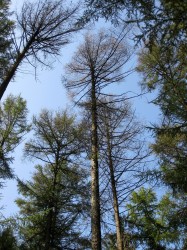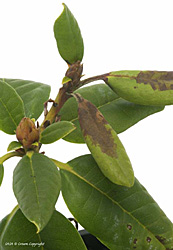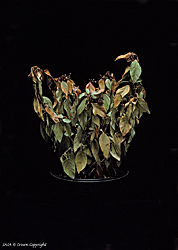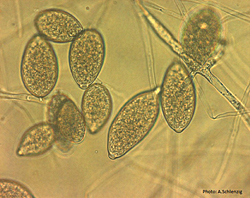Summary
Understanding drivers of emergence and opportunities for mitigation through nursery best practice

The PHYTO-THREATS project aims to address the risks to UK forest and woodland ecosystems from Phytophthora by examining the distribution and diversity of Phytophthoras in UK plant nursery systems. It also aims to provide the scientific evidence to support nursery ‘best practice’ accreditation criteria to mitigate risk of further Phytophthora introduction and spread.
Final report
The multidisciplinary ‘Phyto-threats’ project was initiated in 2016 to address the increasing risks to UK forest and woodland ecosystems from trade-disseminated Phytophthora as implicated in the recent upsurge of Phytophthora diseases in the UK and the establishment and spread of these pathogens in the wider UK environment in diseased propagation material. The project focused on understanding the drivers of emergence of Phytophthora species and opportunities for mitigation by; i) examining the distribution and diversity of Phytophthoras in different UK plant nursery management systems to identify high risk nursery practices, ii) conducting feasibility assessments with nursery managers, consumers and other stakeholders to identify economic and social opportunities and barriers to implementation of best practice, iii) identifying future global Phytophthora threats through modelling biological traits and environmental profiles, and iv) analysing genome sequences of Phytophthora species to gain genetic insights into what makes a species virulent.
Download project final report (PDF, 1.0 MB)
Research Objectives
- Examine the distribution, diversity and community interactions of Phytophthora in UK plant nursery systems

The distribution and diversity of Phytophthora species in water and plant samples collected from different UK plant nursery management systems, including those locations considered to be high risk in terms of importing new Phytophthoras, will be studied using state-of-the-art DNA sequencing technology. Water samples from streams and ponds in amenity environments will also be collected to investigate the wider distribution of nursery-associated Phytophthoras. This work will identify nursery practices resulting in the highest density and diversity of Phytophthora pathogens and the highest probability of onward spread into woodland or other natural ecosystems.
- Provide the evidence base to support nursery accreditation based on ‘best practice’ to mitigate further spread of Phytophthora

For this element of the project we are working with the HTA, Defra and industry to provide the scientific basis to support nursery accreditation. Data from the plant nursery survey (above objective) will provide evidence to guide the development of nursery best practice. Feasibility assessments carried out as part of this objective will involve consultation with nursery managers, consumers and other stakeholders in order to identify economic and social opportunities and barriers, and attitudes towards implementation of such a scheme. We will also explore options to promote the visibility and legitimacy of the accreditation scheme to consumers such that there is an added advantage for nurseries to take part.
- Identify and rank global Phytophthora risks to the UK

Identifying future global Phytophthora threats and potential routes of entry will be essential in refining nursery ‘best practice’ and other national biosecurity measures. To do this, data on current known global distribution of Phytophthoras infecting woody species and biological characteristics that may affect establishment will be collated from databases and national surveys conducted in a broad range of countries. Models will identify those species occurring in locations resembling the UK’s climate and ecosystems and those species that are ecologically similar to Phytophthoras that have established in Europe, strengthening the evidence base for inclusion of pathogens in the UK Plant Health Risk Register. We will also look at the pathways of international trade and tourism and the risks of new Phytophthora introductions via these routes, identifying national focus points for biosecurity based on a raised risk that new Phytophthoras will arrive at these locations. Pathway analyses will be used to inform nursery managers and accreditation scheme criteria of the highest risk trade practices.
- Gain a greater understanding of the evolutionary pathways of Phytophthoras
Current practices are increasing the diversity of co-existing Phytophthoras in the environment, yet we have little understanding of the potential for new aggressive Phytophthoras to arise through hybridisation or other mechanisms of genetic exchange when new species meet. Whole genome sequences of Phytophthora species will be examined to determine the extent to which genetic exchange has occurred among Phytophthoras and related organisms, and how this might have enabled these pathogens to adapt on to tree species, change virulence or host range. This work will enhance our fundamental understanding of pathogen evolution.
Latest Update
This project began on April 1st 2016 and ended on March 30th 2019.
General Content
News
Related documents
- Reducing Phytophthora risk in nurseries – key considerations
- Symptoms of Ill Health in Plants: An Introductory Guide for the Horticultural Sector
- Understanding high risk hosts for Phytophthora
- Guidance on plant waste disposal
- Phyto-threats Research Summaries June 2018
- Participants flyer
- Research summary April 2017
- Phyto-Threats: nursery sampling for Phytophthora
- Plant Health for the Horticultural Sector
- Plant Health for Planting Schemes
Downloads
Consumer Survey Summary Report
Attitudes and Behaviours of the UK’s Plant-buying Public
Nursery and Garden Centre Summary Report
Attitudes towards Biosecurity and Accreditation
Research Article
Buying better biosecurity: Plant-buying behaviour and the implications for an accreditation scheme in the horticultural sector
Research Article
Perceptions of Biosecurity-Based Accreditation in the Plant Trade: A UK Example
Plant Health for Plant Nurseries Training Event October 2023 Presentation Slides
Funding & Partners
-
 Forest Research (FR)
Forest Research (FR) -
 James Hutton Institute (JHI)
James Hutton Institute (JHI) -
 Centre for Ecology and Hydrology (CEH)
Centre for Ecology and Hydrology (CEH) -
 University of Edinburgh
University of Edinburgh -
 University of Worcester
University of Worcester -
 Animal and Plant Health Agency (APHA)
Animal and Plant Health Agency (APHA) -
 Science and Advice for Scottish Agriculture (SASA)
Science and Advice for Scottish Agriculture (SASA)
